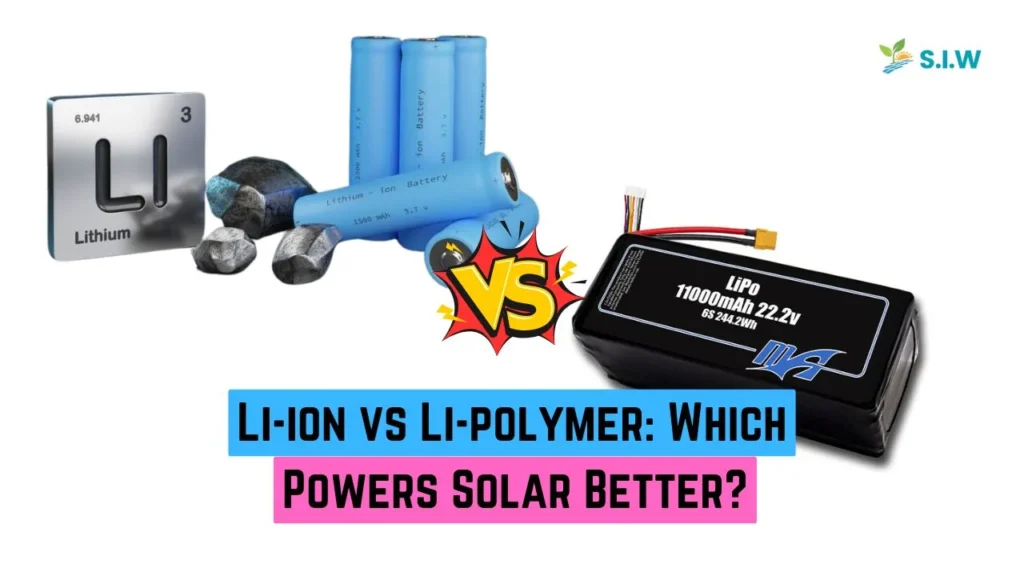As solar energy continues to expand in popularity, choosing the right battery for energy storage is essential. The two most widely used battery types, Lithium-ion (Li-ion) and Lithium Polymer (Li-polymer), offer unique characteristics that impact their performance in solar systems. In this article, we will explore the differences between these technologies and help you determine which is the best fit for solar power applications.
What Are Lithium-ion Batteries?
Lithium-ion batteries are commonly found in consumer electronics, electric vehicles, and renewable energy systems. They are known for their high energy density, long lifespan, and efficient energy conversion, making them a reliable choice for solar storage.
Main Advantages of Li-ion Batteries
- High Energy Density: Li-ion batteries can store more energy relative to their weight, which is a key factor for solar energy storage where space efficiency is crucial.
- Extended Cycle Life: Li-ion batteries typically handle between 500 to 1000 charge/discharge cycles before their capacity begins to degrade. This longevity is critical for solar systems that undergo daily cycling.
- Efficiency: Li-ion batteries are very efficient, with up to 95% of the energy stored being retrievable. This level of efficiency is particularly important when every bit of solar energy matters.
- Temperature Sensitivity: While these batteries perform well under normal conditions, they are more vulnerable to high or low temperatures, which can affect their reliability in outdoor solar systems.
- Cost: Generally, Li-ion batteries are more affordable than Li-polymer batteries, making them a more economical option for larger solar setups.
What Are Lithium Polymer Batteries?
Lithium Polymer batteries share similarities with Li-ion batteries but differ in design, using a solid or gel electrolyte. These differences provide unique advantages, especially in applications requiring flexibility in battery size, safety, and weight.
Key Advantages of Li-polymer Batteries
- Flexible Design: The use of a polymer-based electrolyte allows Li-polymer batteries to be molded into various shapes and sizes, making them ideal for spaces with limited room.
- Improved Safety: Li-polymer batteries are considered safer than Li-ion as they are less prone to leaks and damage. This feature makes them an attractive option for solar installations that prioritize safety.
- Lighter Weight: They are lighter than their Li-ion counterparts, which is useful for mobile or portable solar solutions.
- Better Thermal Performance: Li-polymer batteries can handle higher temperatures better, making them suitable for solar systems exposed to extreme climates.
- Cost Considerations: Li-polymer batteries tend to be more expensive than Li-ion batteries, limiting their use in large-scale solar storage systems. However, their safety and performance benefits might justify the cost in specific cases.
Comparing Li-ion and Li-polymer for Solar Power
When comparing these two battery types for solar energy storage, several factors must be considered. Here’s a breakdown of the major differences:
| Factor | Li-ion Batteries | Li-polymer Batteries |
| Energy Density | High energy density, ideal for large solar systems | Lower energy density but more compact design |
| Cycle Life | 500-1000 cycles | Similar, but may degrade faster under heavy loads |
| Safety | Higher risk of overheating and leaks | Safer with fewer risks of damage or leaks |
| Cost | Generally less expensive | Higher cost, making them suitable for niche applications |
| Form Factor | Rigid, fixed design | Flexible, adaptable to various shapes |
| Temperature Tolerance | Less effective in extreme temperatures | Better performance in high-temperature environments |
Applications of Li-ion and Li-polymer in Solar Power
Li-ion Batteries in Solar Applications
Li-ion batteries are commonly used in residential and commercial solar energy storage systems due to their cost-efficiency and high energy density. They offer excellent energy conversion rates and can last for several years with proper thermal management. However, care must be taken in systems that are exposed to extreme temperatures to prevent potential overheating.
Li-polymer Batteries in Solar Applications
Li-polymer batteries are more suited to specialized applications, such as portable solar generators or systems used in regions with harsh climates. Their lighter weight and flexibility in design make them ideal for off-grid solar systems or solar setups where space is a constraint. However, their higher cost typically restricts their use in larger installations.
How to Choose the Right Battery for Solar Energy Storage
When selecting a battery type for solar energy storage, the following considerations are key:
- Large-Scale Solar Projects: Li-ion batteries provide the best balance of cost, efficiency, and energy density.
- Portable or Harsh Environment Applications: Li-polymer batteries may be better suited due to their light weight, flexibility, and enhanced thermal resistance.
Frequently Asked Questions
1. Which battery is more efficient for solar storage?
Li-ion batteries are more efficient with up to 95% energy efficiency, making them the preferred option for maximizing solar energy.
2. Can Li-polymer batteries be used in solar energy systems?
Yes, especially in systems where weight, space, and safety are critical, such as in portable or off-grid setups.
3. Which is safer: Li-ion or Li-polymer?
Li-polymer batteries are generally considered safer due to their more stable composition, reducing risks of leaks or thermal runaway.
4. Why are Li-polymer batteries more expensive?
The advanced materials and manufacturing processes involved in making Li-polymer batteries lead to higher costs, but their performance and safety features can justify the expense in specific applications.
5. How long do Li-ion and Li-polymer batteries last in solar systems?
Both types typically last 5-10 years, depending on usage. Proper maintenance can extend their lifespans, making them suitable for long-term solar storage.
6. Are there environmental concerns with either battery type?
Both battery types are recyclable, though Li-ion batteries are more commonly recycled due to their widespread use. Proper disposal is essential to minimize environmental impact.
By understanding the strengths and limitations of Li-ion and Li-polymer batteries, you can make an informed decision to optimize solar energy storage for your specific needs.








